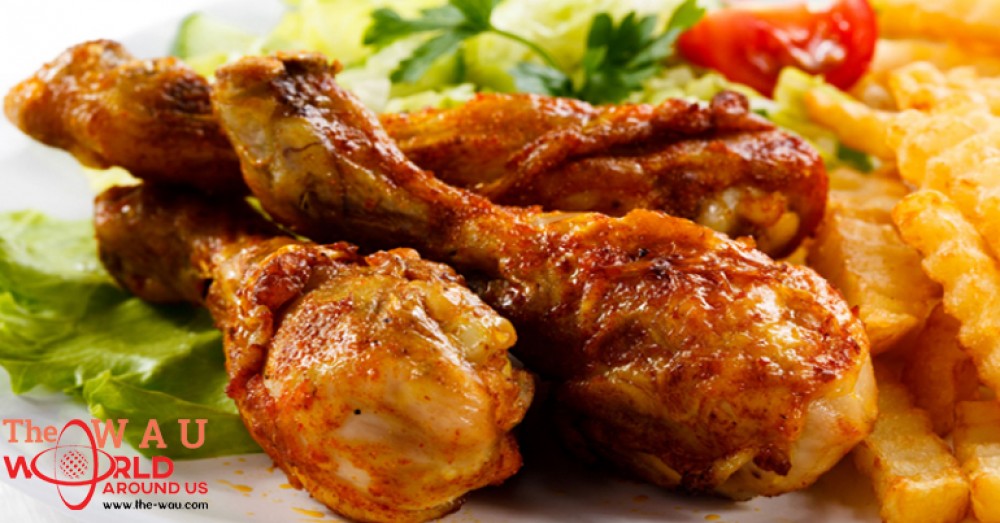Though chicken is considered healthier than red meat, broiler chicken is not. It has antibiotic-resistant bacteria like E. coli, which causes diarrhea and UTI. You may kill the bacteria by cooking chicken at 165 °F, but grilling or frying the chicken raises cancer risk. Eat roasted or stewed organic or free-range chicken, but not at the cost of fresh veggies and fruits.
What side effects does eating chicken have?
- Broiler chicken causes food poisoning
- Broiler chicken carries antibiotic-resistant germs
- Chicken has a high cholesterol content
- Grilling or frying chicken raises cancer risk
- Risk of arsenic exposure from chicken feed
If you’ve been trying to build muscle or cut down on fat, you must have been pointed toward chicken as the best source of lean protein. Maybe, chicken is your go-to for all the protein you need in a day. But much as we’d like to believe that chicken is a really healthy food, we can’t treat it as the healthiest option on the shelves. Is it better than processed meats? Yes. Is it better than some fatty red meats? Yes. Is it the best option for your daily dinner and lunch? Maybe, maybe not.
That’s not to say chicken doesn’t have a lot of goodness in it. With nutrients like vitamins B, C, and folate, as well as selenium, calcium, iron, zinc, magnesium, phosphorus, and potassium, it is a good lean-protein option for those who need their fix of meat.2 But it may not be healthier than certain fish or a great option if eaten at the expense of your daily dose of fresh vegetables and fruits.
Plus there are these side effects of eating chicken. Some of these are directly linked to broiler chicken, while the others are linked to wrong cooking techniques.
1. Food Poisoning From Broiler Chicken
Food poisoning from Salmonella, Campylobacter spp., and other bacteria and germs in chicken remains a very real possibility. The United States has the highest per capita consumption of chicken in the world. And 1 in 6 Americans has at least one bout of food poisoning or contracts food-borne illnesses every year.
Studies have been conducted in Europe, the UK, and on American shores to check samples of chicken sold by various brands at retail outlets. The results have been worrying, with some reports finding harmful bacteria in as much as 97% of all sampled chicken.
Cook the chicken to at least 165 °F to kill any germs and bacteria.
Don’t let raw chicken come in contact with your salads or fruits.
Keep a chopping board exclusively to prepare raw chicken.
Broiler chickens often end up contaminated with fecal matter in their congested breeding quarters and harbor the notorious Escherichia coli or E. coli bacteria. If the food is improperly prepared, this bacteria causes bouts of diarrhea.
Apart from tummy bugs, it could also cause a urinary tract infection and pneumonia or respiratory illness. While processing takes care of rinsing, there may still be traces on the birds.
Moreover, research has found that it isn’t just regular E.coli but antibiotic-resistant strains that are increasingly common across different kinds of chicken – regular chicken, kosher, organic, and even chicken that are meant to be raised without antibiotics!
2. Risk Of Antibiotic-Resistant Bacterial Infection From Broiler Chicken
Antibiotic-resistant strains of bacteria are a problem that the medical community is still grappling with. And mass-produced broiler chicken isn’t helping the cause. The widespread use of antibiotics given to chickens to help keep off infections is adding to this problem.
Choose organic or free-range chickens when you can.
There is also some concern around the possible impact on human gut flora of consumption of food with possible traces of antibiotics. However, further research in this area is needed.
Meanwhile, there is news on antibiotic-resistant strains of Salmonella not responding to conventional treatment of food poisoning caused by contaminated chicken.
...[ Continue to next page ]
Share This Post












